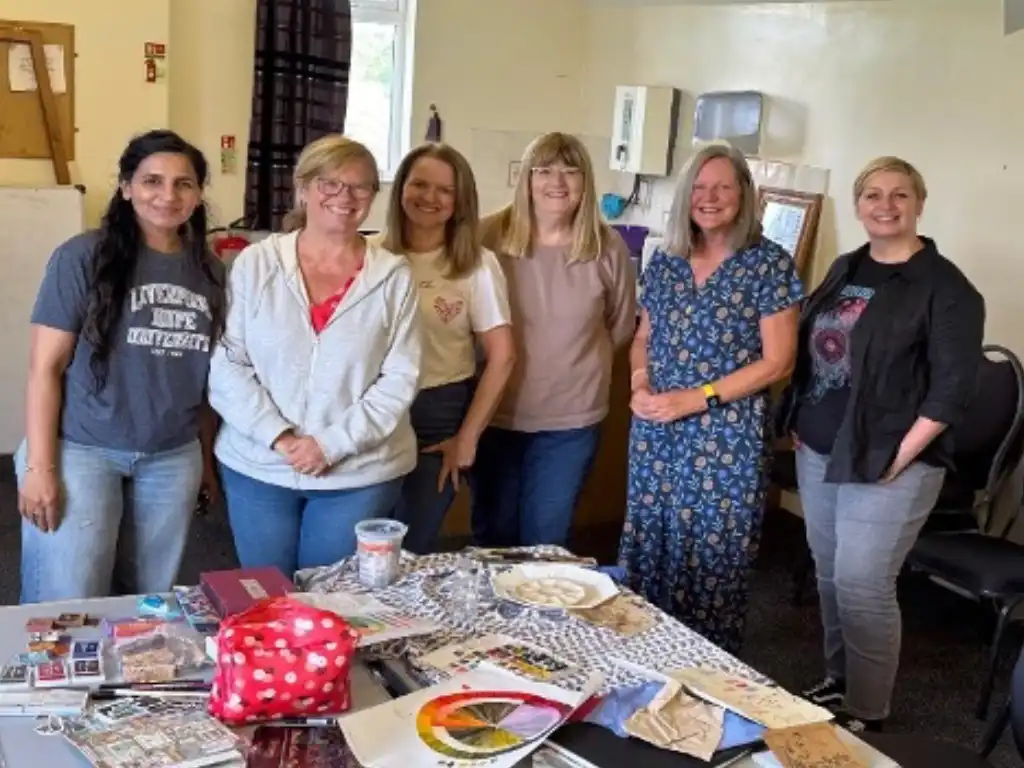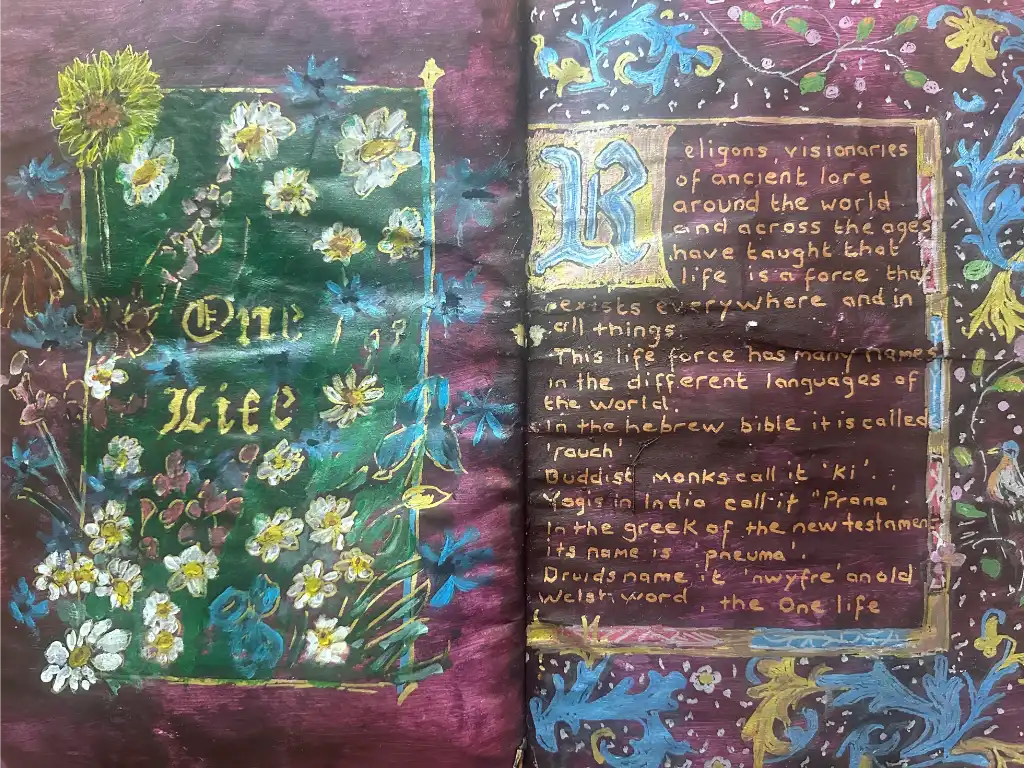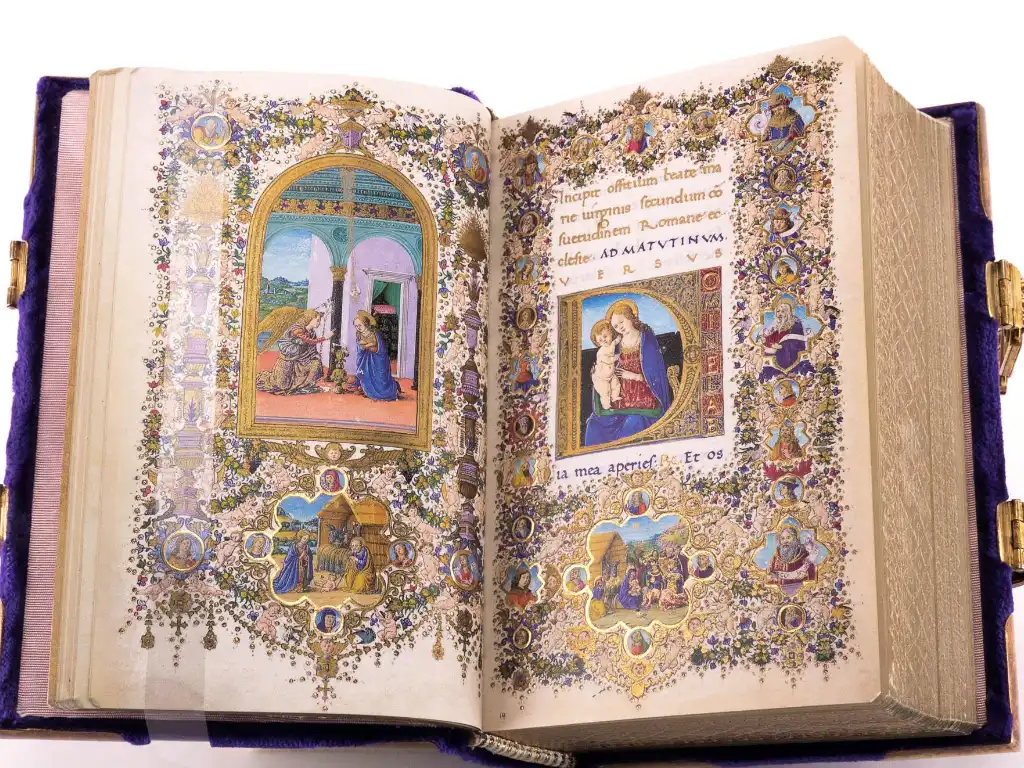Book of Hours in their original formation, were intimate, private possessions that were consumed in solitude and most likely silence. They are now seen as major cultural relics of the early to late mediaeval period in Europe. According to Hayman (2017: 5) ‘they have always had the connotation of hidden treasure and have retained a special mystique’. This idea of ‘mystique’ is confirmed by the sheer artistic brilliance that are characteristic of these manuscripts. Prior to the introduction of the printing press in 1450, each manuscript was crafted by hand, each step of the process demanding resources, skills and time. From their origins as early as the 8th century in Ireland with the production of illustrated manuscripts as majestic the Book of Kells, through to the popularity of the Book of Hours for personal use, the journey of these highly decorated and immensely attractive books reflects the level of skill and knowledge that went into their creation. The manuscripts were extremely expensive to produce and became the property of religious sects or royalty until later in the mediaeval period. As international trade evolved particularly with developments in navigational technologies, a rise in the merchant class who lacked the social status afforded to aristocracy, had a keen appetite to ornate their person with a Book of Hours, which in turn commanded social recognition. The Book of Hours became a regular feature on an individual’s person, and would remind the person that throughout the day, they should stop and take time to reflect or meditate on the contents of their personalised book. This project is to bring the concept of the Book of Hours into the 21st century and to build upon the original intention for the Book to become part of a person’s daily routine, encouraging reflection, meditation, and an inner peace. We have come a long way since the mediaeval ages, especially if we look at developments across the spectrum of human activity. Considerable advances in engineering, technology, navigation, medicine are instantly recognised, however, with all these developments and key societal moments like the industrial revolution from the 1750s onwards, our society is still plagued with a need to protect the person as they navigate their way through this fast paced life. Despite the flurry of developments, people continue to feel isolated, often lonely and are caught up in the rat-race that is modern living. Taking time out of our busy daily schedules to contemplate and consider ourselves and the health of our minds and general well being is under pressure. This project hopes to help people consider the structure of their day, and how positive affirmation, stories of inspiration, prose, poetry, prayers (if one is religious/spiritual) can have a positive effect on our overall well being when integrated into the everyday. It is important that we take time out, to feed our minds and recharge our sense of who we are and why we are important – each and every one of us.
Steve Jobs, the co-founder of Apple, suggests that the most precious resource we all have is time. This statement may seem a tad ironic if you are part of the prison system, or a care home, or hospital, where time is often perceived as something which drags out. However, what this statement does suggest is that whatever the situation we find ourselves in, how we use the time that we have is of real value. This project will invite you to consider your day, and how much time you can afford to give to your mind. The Book of Hours that you will create will ensure that should you need a moment of reflection, you will have access to material that will help bring peace to your mind, and inspiration to your soul. The intention of the Book of Hours is to be consulted throughout the day, at particular times when your mind is in need of some nourishment. The contents of the book are guided by the preferences of the creator. To be reminded of what is important to us and what we hold precious throughout any given day will help our mental stability and peace of mind.
Importance of the Book of Hours in today’s time
by Varsha Manglam
In an age dominated by digital screens and instant connectivity, the Book of Hours may seem like an anachronism, a relic of a bygone era when illuminated manuscripts were the pinnacle of artistic and spiritual expression. Yet, as we find ourselves increasingly disconnected from the simple rhythms of life; through the workshop there grew a resurgent interest in the Book of Hours and its significant role in providing spiritual and artistic solace and encouragement for mindfulness in today’s fast-paced world.
The Book of Hours workshop invites the participants to take a pause and reconnect with themselves through art. The importance of such a practice cannot be overstated; dedicated time for reflection and artistic experimentation leading to moments of quiet contemplation that which is essential for mental well-being. The workshop sessions gave an opportunity to reset the mind and focus on personal intentions, gratitude, or contemplation of life’s deeper meanings.
This workshop offered the participants to develop a unique artistic expression that includes the intricate illustrations and beautiful calligraphy found in the their book of hours which showcase the artistic skill developed by the participants during these workshops. These artistic elements make the Book of Hours both aesthetically pleasing and culturally enriching.
The workshop encouraged contemporary interpretation and personalization of the Book of hours allowing participants to resonate with their unique artistic journey. This flexibility makes the Book of Hours not just a historical artifact but a living document that can evolve to meet contemporary spiritual and artistic needs.
The Book of Hours project offered a sense of connection and community through sharing experiences and discussions on the individual topics of the book of hours . This served as a reminder of the importance of fellowship in spiritual journeys, supporting mental well-being and a sense of belonging.
About the Book of Hours workshop
The journey of conducting the workshop began with thorough planning. I aimed to create an environment that fostered discussion among participants, reflection and creation of the contemporary Book of Hours. I gathered various art materials (provided by the university) such as small size paper book, ink pens, watercolours, stickers and calligraphy tools to allow participants to engage in authentic manuscript creation.
Promotion of the workshop was essential. I utilized social media, local community boards, and partnerships with local art group to attract participants from diverse backgrounds. The workshop appealed to people from different backgrounds such as artists, students and anyone curious about the significance of this medieval artifact.
The primary objectives of the workshop were to educate participants about the history and function of the Book of Hours, to develop an appreciation for the intricate artistry involved, and to create a personal Book of Hours as a tool for mindfulness and reflection. Additionally, I wanted participants to engage in discussions about the themes of their book of hours and personal creativity.
The workshop unfolded over six sessions in which I introduced the historical context of the Book of Hours, examining its evolution from a monastic object to a personal devotional book. We discussed how individuals in the Middle Ages used these books not only for prayers but as a means of meditative practice—a concept that resonates with the rituals of mindfulness and gratitude popular today.
After the introduction, participants were guided through the art of calligraphy, using traditional techniques to write prayers, poems and verses that held personal meaning for them. The participants were also showed many art techniques and colour theory concepts. The atmosphere was filled with creativity and reflection as each person designed their own pages, incorporating illustrations and motifs that resonated with their inner selves.
In the workshops, we also explored the concept of incorporating modern elements into our personal Books of Hours. Participants were encouraged to include contemporary prayers, affirmations, or quotes that inspired them, merging their historical appreciation with present-day relevance. We also engaged in discussions about the importance of carving out time for spiritual reflection in our busy lives, drawing parallels between our workshop experience and the original intent of the Book of Hours.
As participants immersed themselves in the art and practice of creating a Book of Hours, it became clear that this workshop was more than an artistic endeavour; it was a much-needed respite from the modern chaos. In an age where mindfulness practices such as meditation and journaling are promoted for mental well-being, the Book of Hours offers a historical framework for these traditions, suggesting that the need for personal reflection has been intrinsic to human experience for centuries.
Conducting the Book of Hours workshop was an enriching experience by reviving the customs of the past, that can inspire meaningful practices in the present. The Book of Hours serves not only as a historical artifact but as a powerful reminder of the importance of taking time out of our lives to reflect, connect, and create. I left the workshop with a renewed appreciation for this medieval book and the hope that participants would carry forward the lessons of spirituality and creativity in their modern lives.


